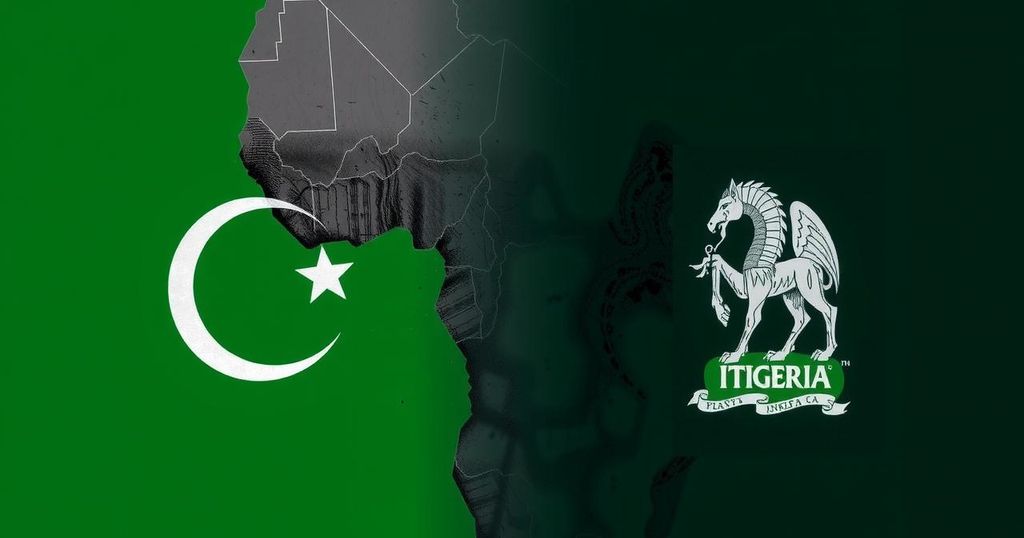Libya-Nigeria Football Incident: A Call for Unity and Reform in African Sports
The AFCON qualifying match between Libya and Nigeria on October 15, 2024, resulted in international controversy characterized by allegations of misconduct and unsporting behavior. The Nigerian team faced hostility upon their arrival in Libya, including denial of basic necessities and restrictions on their movement. The situation raises concerns regarding the roles of CAF and FIFA in managing such conflicts and highlights the need for stricter penalties for unsporting conduct within African football. Furthermore, the incident underscores the detrimental effects on unity and goodwill among African nations amid broader aspirations for cooperation.
The recent Africa Cup of Nations (AFCON) qualifying match between Libya and Nigeria, held on October 15, 2024, became a testament to the ongoing turmoil that often shadows African football. What should have been a celebration of sporting talent quickly devolved into a spectacle of international controversy, marked by allegations of misconduct and a concerning deterioration in sportsmanship. To comprehend the situation, one must consider the preceding match in Uyo, Akwa Ibom State. This encounter, expected to be straightforward, ignited a series of accusations between the two nations. The Libyan side claimed mistreatment by Nigerian officials and supporters, alleging inadequate hospitality, while Nigerians countered that Libya had engaged in provocations aimed to unsettle their team. Reports suggest that while tempers flared, the allegations from the Libyan camp were exaggerated, with no tangible evidence of any conspiracy against them. It appears Libya sought to position themselves as victims, possibly as part of a psychological tactic leading up to the return leg. The behavior of the Libyan team during the match raised further concerns. Their strategy, which veered towards negative tactics, included time-wasting and dubious fouls, seemingly aimed at derailing Nigeria’s Super Eagles. One notable incident involved a disallowed goal by Ademola Lookman, seemingly ruled offside under dubious circumstances, which left many fans bewildered. The officiating raised eyebrows, where external pressures appeared to compromise the integrity of the match. Post-match, Libya issued veiled threats of retaliation for the second leg, which, regrettably, they executed. Upon arriving in Libya, the Nigerian team was subjected to severe discomfort and hostility—lacking essential amenities and facing obstructions even in boarding their arranged transportation. Their situation was exacerbated when their flight was redirected to an isolated airport, leaving them stranded and uncomfortable, fostering an atmosphere of fear and uncertainty. This incident raises critical questions regarding the roles of the Confederation of African Football (CAF) and FIFA in overseeing such matches. Historically, both organizations have struggled to effectively manage unsporting incidents, often resorting to minimal penalties that fail to deter future occurrences. Their prior lack of robust intervention suggests a tendency to overlook significant issues rather than addressing them decisively. The repercussions extend beyond sport. Incidents like the Libya-Nigeria qualifier erode goodwill among African nations and tarnish the image of continental football. With the African Union striving for integration and cooperation, such occurrences undermine the message of unity that sports could otherwise promote. When football competitions transform into diplomatic disputes, they contradict the ideals of solidarity among African nations. To avert future problems, a fundamental overhaul in CAF and FIFA’s disciplinary frameworks is essential. Stricter sanctions for unsporting conduct are necessary, and host nations must be held accountable for the treatment and safety of visiting teams. Furthermore, fostering positive interactions among African football associations can mitigate hostility during competitions. Initiatives like joint training sessions and cultural exchanges could enhance mutual understanding and cooperation across borders. Ultimately, the friction between Libya and Nigeria transcends a simple sporting setback; it underscores the challenges that persist in cultivating brotherhood within African football and the continent at large. A united front is imperative not only for the sake of football but also for the broader aspirations of Africa’s socio-economic collaboration. If the continent’s nations cannot coexist harmoniously in sport, the prospects for collaborative growth remain dim. The Super Eagles’ encounter may have been a setback, but it presents an opportunity for African football to emerge from chaos, stronger and more cohesive than before.
The context surrounding the match between Libya and Nigeria highlights the frequent instances of chaos within African football, often compounded by political tensions and lack of adequate governance from overseeing bodies. The relationship between football and national pride in Africa adds another layer of complexity, where matches are not merely contests of skill but also reflect broader national sentiments. Understanding these dynamics is critical in assessing the implications of the Libya-Nigeria incident, particularly in light of previous occurrences where similar disputes arose, contributing to the overarching narrative of disunity within the sport across the continent.
In conclusion, the AFCON qualifier between Libya and Nigeria illustrates a pressing need for reforms within African football governance. The events that unfolded manifest a wider challenge that jeopardizes not only the integrity of the sport but also the potential for unity among African nations. The path forward demands a concerted effort to improve disciplinary measures, foster collaboration among football federations, and ultimately transform the narrative surrounding African football from one of chaos to one of solidarity and growth.
Original Source: www.thisdaylive.com




Post Comment